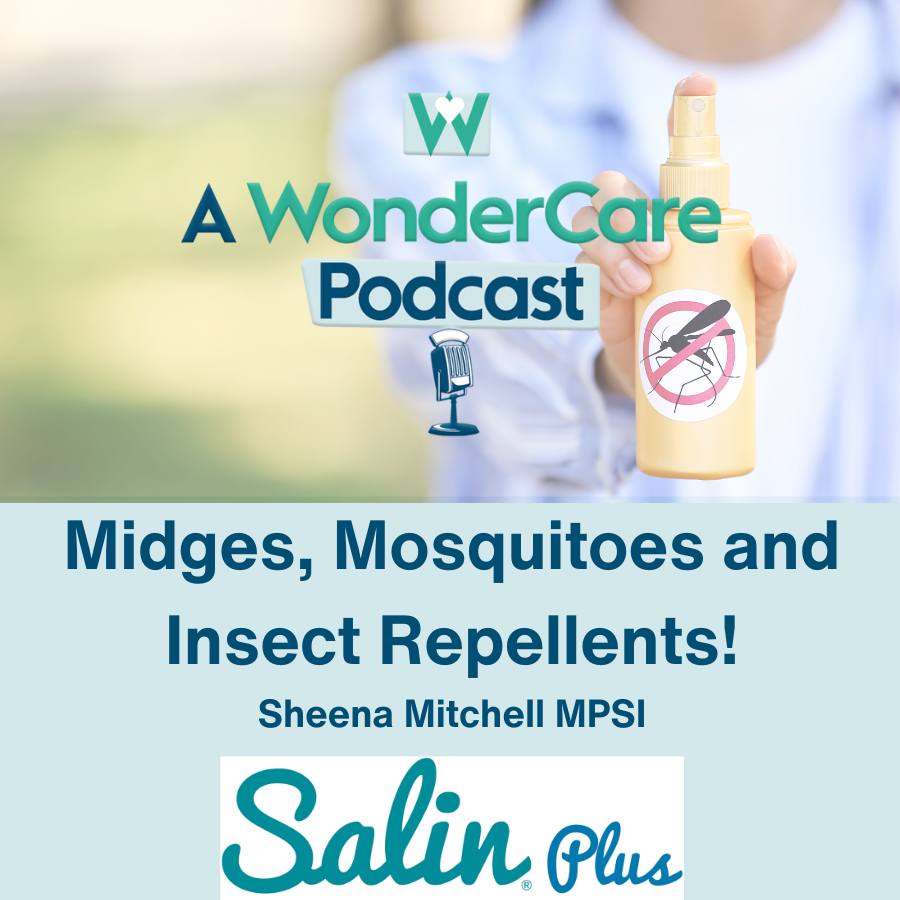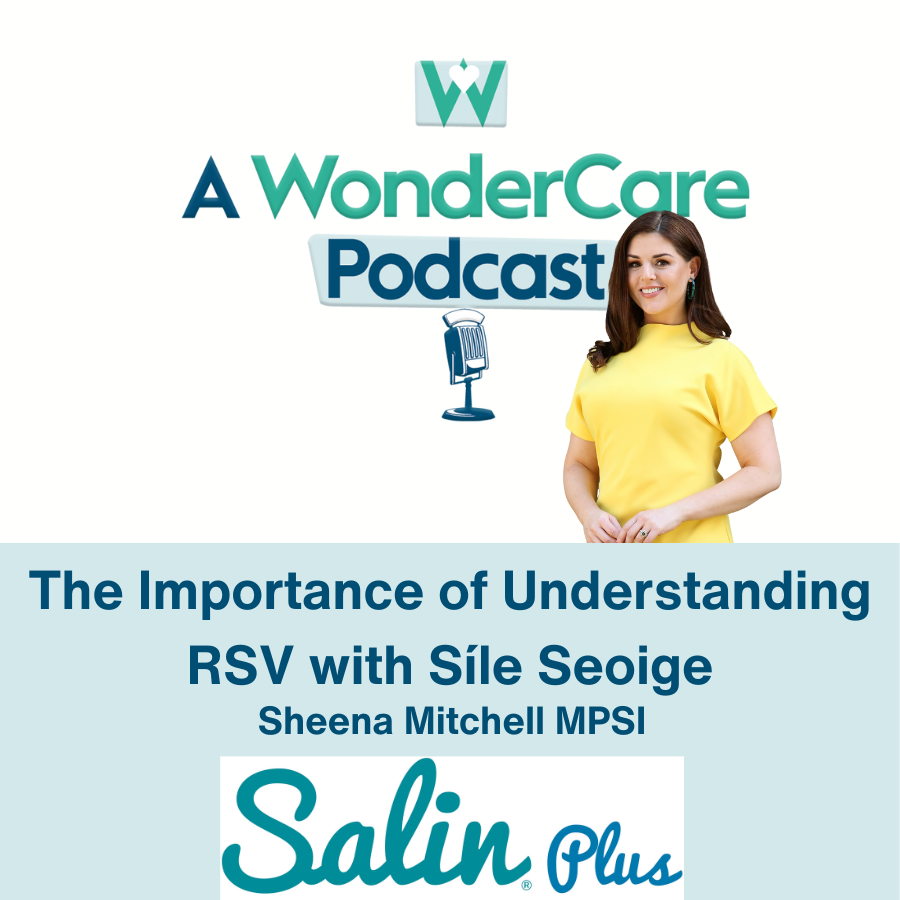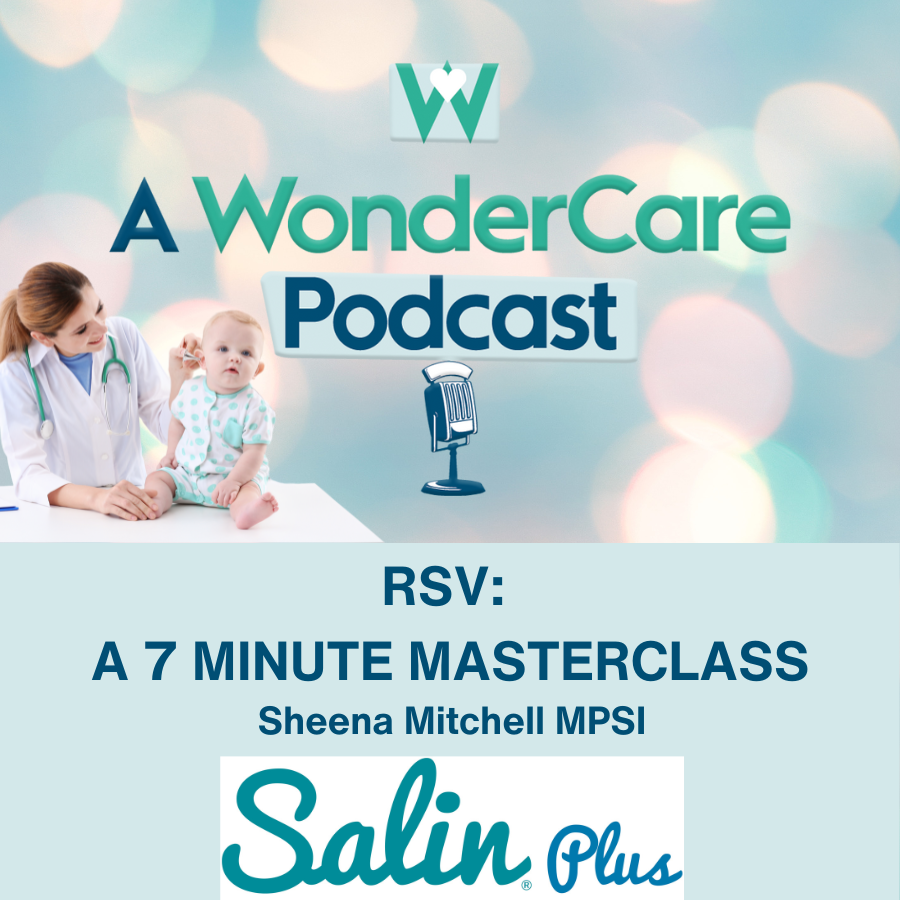Episode Transcript
[00:00:04] Speaker A: Hello and welcome to a Wonder Care podcast. I'm Sheena Mitchell, a pharmacist and mum of three. I combine healthcare and practical advice to support you on your parenting journey. This week I'm talking all about the potential impact RSV vaccines could have on our healthcare system. It's no wonder that RSV has become such a hot topic lately. We know that the majority of children will contract RSV by the age of two. One to 2% of all children who contract RSV will require hospitalization. Currently in Ireland, we have 96 700 children on a hospital waiting list for either an inpatient or daycase treatment. This reflects a 36% increase since last year. There is a risk that children are missing interventions which could have serious and long lasting health impacts on these kids, as well as developmental issues. Our children deserve a health service that works for them. RSV comes at a time of year when our health service is already burdened with diseases like flu and now COVID, neither of which are going anywhere. Our health system is so stretched even during the summer that in the winter it really cannot afford any additional pressure. And unfortunately, RSV or the respiratory syncticial virus does exactly that. I'm not going to go into too much details about RSV in this episode, but I will put a link to a previous episode that I've done which explains all of the signs and symptoms of RSV and the conditions that it causes, like bronchiolitis, that's available in the show notes today. I want to talk about if RSV vaccines are the answer, and could they be somewhat of a quick fix to our very broken health service? I'm going to start with what we know about the RSV virus. First of all, it was discovered in 1956, and it's been a notifiable disease in Ireland since 2012. There are two subtypes of human RSV. There's RSVA and RSVB. Both of these cause similar levels of respiratory disease. It has a two to seven day incubation period. This means that your child will become symptomatic two to seven days after exposure. InteresTingly, around 70% of hospitalized children are not from high risk groups. So this is a disease that does not discriminate. It can cause bronchiolitis and pneumonia in around 25% to 40% of patients on their first infection. If a child requires a hospital stay, their average length of that hospital stay will be two and a half to three days. RSV treatment is really difficult because there is no cure. As such, it's supportive care that's given in hospital for example, your child may need IV fluids or low flow oxygen or high flow oxygen or other interventions. Of course, in the 98% of children who don't require hospitalization, you're really just supporting their care at home. And I've outlined how to do that in the episode that I flagged earlier. A really important piece of information to consider is that there is some evidence which suggests that RSV plays a role in the later development of asthma. We know that asthma causes the state 472,000,000 per year. It causes 8000 hospital admissions every year. And we know that there are 2.4 million GP consultations about asthma in addition to this every year. So it's clear to me that RSV is causing a serious and un ignorable burden on our health system recently and you've probably seen this in some of the papers, RSV vaccines have been developed, and I don't want to delve too deep into the science, but some of it is quite easily explained. We know that the RSV virus has F and G proteins and it's these which bond to human cells and cause infection. We also know that previous vaccine efforts failed due to an unstable F protein in vaccines. That's why, unlike flu, we haven't been able to have an RSV vaccine. But thanks to clever science, this has been overcome in recent years and a stabilized RSV F protein was successfully formed into a vaccine antigen. This means that a vaccine containing a stable F protein could be administered to patients and they would then be able to produce their own antibodies, just like they would with any other vaccine. It was actually this science that enabled the development of COVID vaccines. And so in the pandemic, we were very lucky that scientists had been working really hard on stabilizing these types of proteins, because otherwise we might have been waiting an awful lot longer for a COVID vaccination. The reality is that RSV is a high risk disease with no set treatment. It's highly contagious and infants can continue to spread it for up to four weeks, even if they've recovered after the typical eight to 15 days of illness. It spreads through coughs, sneezes, spit. It lives on hard surfaces for four to 7 hours. So you can catch RSV by touching an infected object. We all know how to prevent infection spread through good hygiene measures, but unfortunately we don't live in a sterile bubble and nor is it a practical thought that we should strive to. So whilst we can do our best, we can't completely reduce risk to our newborn babies, especially those under one who are most at risk. But really, children under four are the most impacted age group. And we can't alienate these children from the rest of the world and keep them wrapped up in bubble wrap, away safe from every virus. And this is why there is a lot of talk about these vaccines. The FDA in America was first to approve these vaccines. The EMA in Europe followed soon after. There are currently four main contenders in this market. I'm going to explain them a little bit so that you know what's hopefully coming down the road. So Pfizer have made a vaccine called Aberisfo, and it was approved by the EMA in August 2023 for adults over 60 years and as a maternal vaccine. So for mothers during pregnancy, to protect their infants from birth, from lower respiratory tract disease, from RSV for up to six months. I'll explain that a bit more in a minute. GSK also have a vaccine, and it's called RXV. And this was approved by the EMA in June 23. This is just approved for the immunization of adults over 60 years for the prevention of lower respiratory tract disease caused by RSV. Moderna also have plans to request approval for a vaccine, but I don't think that's happened yet. And finally, we have BayFortus. This one is a little bit different. It's a preventative treatment brought to the market by Sanofi and AstraZeneca. It's Different because you will probably see this referred to as a vaccine, but actually, it's not a vaccine. So, as I mentioned earlier, a vaccine Is when we administer an antigen, so a part of a virus, into the body, which triggers your body to produce antibodies in an immune response. So when you come across that virus in real life, you have antibodies ready to tackle it so that you don't get ill. BayFortis actually involves the administration of antibodies directly to a baby to protect them from RSV for their first season. So instead of stimulating an immune response, we're actually just directly giving them readymade antibodies. All of these vaccines reflect amazing advances in science, and they serve to reduce the burden of RSV on babies health and our health system. First off, I'm going to explain that last one there a little bit more. So, BayFoRtus. So this is the one that is brought to market by AstraZeneca and Sanofi. The drug name is NurseivaMab. As I mentioned, this is Where a baby is given protective antibodies to limit their risk of lower respiratory tract disease during their first AuriSV season. If a baby is born in AuraSV season. So this is approximately October to March. Then it's recommended that they're given the medication within one week of birth. If a baby is born outside of AuraSV season, then you just wait until shortly before their first AuriSV season before you give it. GOod NEWS Is that it can be given with other childhood vaccinations. Other great news is that studies have shown it reduces RSV hospitalizations by a whopping 83%. While the concept of this preventative treatment might sound very new, a similar drug has actually been used in high risk babies for many years already in Ireland, and this is known as halivizumab or the brand name synergis. So we've already been dispensing synergis from our pharmacies for babies who have been at really high risk of respiratory disease. The one problem with synagogis is that it's kind of tricky for practical reasons because it has to be given monthly for up to five months. The benefit of this new one bay Fortis is that it's a single shot which will last up to six months.
[00:09:02] Speaker B: I am delighted to partner with one of my all time favorite products, salon plus, this is the world's 1st 100% natural dry salt therapy device. It's clinically proven to relieve a wide variety of allergens and respiratory conditions. This salt therapy method has been trusted for generations and has become hugely popular worldwide. As more and more people recognize the superb results achieved from a natural and non invasive method, this device will help you breathe easier and sleep better.
[00:09:34] Speaker A: Okay, so the other two vaccines, which are vaccines in their traditional sense. So we have Pfizer, who has Aberisfo, and then we have GSK, who have RXV. Aberisfo is of more interest in terms of protecting babies health, and both vaccines can protect people who are over 60 years of age. These vaccines are like the flu vaccines in that they don't contain the live virus. Scientists found a way to isolate the protein which is found on the Auris virus. And so this is given as a vaccine so that the person will make their own antibodies. In the case of arborispho, it can be given to women who are 24 to 36 weeks pregnant. The expectant mum will then make her own antibodies and these antibodies will be passed on to her baby. After her baby is born. They'll be protected for up to six months. This is completely amazing. The most at risk age group is literally being born with antibodies to protect them from the severe effects of RSV in their first season. Babies at high risk could then potentially be given Bay Fortis for their second RSV season. The use of Aberusfo in pregnancy was shown to be successful in phase three trials in studies offering 81.8% protection to the newborn. RXV isn't used as a maternal vaccine, which means it's not given during pregnancy. So its role is in protecting adults over 60 and it's been shown to be 82.6% effective. As our population gets older, your immune system becomes weaker, and so after children under four, the over 60s are the next most vulnerable group. So I don't want to proceed through this episode without acknowledging that that is a really significant thing for public health. Currently, BayFortus has been approved by the EMA. The Pfizer vaccine, Aberisfo has also been approved by the EMA, as has RXV by GSK. Very recently, the good news became available that NIAC have actually made recommendations for RSV passive immunisation and vaccination. This means that NIAC are recommending that we protect our vulnerable groups from RSV. Obviously, nothing is straightforward in these decisions, and further analysis of cost and product availability is needed to determine which product is most suitable for Irish use. I'm going to be following with interest to see how quickly our approval system can work to mean that these vaccines are available to treat patients and reduce the pressure on our healthcare system. NIAC's approval is definitely a step in the right direction, but there's no indication of when any decisions will be made. These processes can take anywhere up to two years. I really hope we're not waiting that long, really. I wanted to record this episode to try and, I suppose, explain how these vaccines work and to reassure you that science is developing exciting new options. I really hope they become available in Ireland soon. They're already being administered in America. With our health service struggling each and every winter, and with no sign of hope of improvement in capacity, I think this is a really great opportunity to protect infants and the elderly and in turn, remove some of the heavy burden of our hardworking healthcare professionals in hospitals and GP clinics. The potential for its impact on asthma. Well, I just personally can't wait to hear about more than that, because that's going to be another significant impact on our health system. I really hope we're not waiting too long for these vaccines, and I hope when they are rolled out, that we don't have supply issues, because, honestly, every great drug that comes out, we seem to be told about it and then not be able to get it. So I hope that isn't the case with these seasonal changing medicines. Hope you found that interesting. If you enjoy listening, I'd be really grateful if you could follow or subscribe and leave a review. It really helps to support the show. Thank you.


